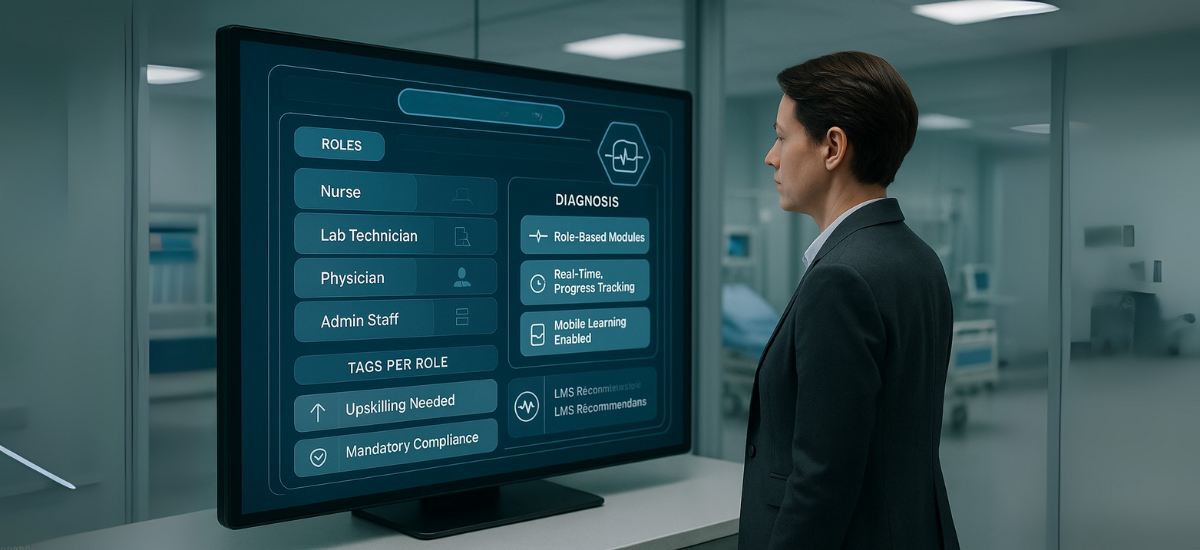Choosing the Right Digital Learning Platform for Healthcare Organizations

In an industry where every second counts and compliance isn't optional, healthcare organizations face a unique challenge: how to deliver consistent, up-to-date training to a diverse, dispersed workforce while maintaining strict regulatory standards. The answer? A purpose-built digital learning platform designed to meet the needs of the healthcare sector.
This blog explores what makes a digital learning platform effective for healthcare organizations, what features to prioritize, and how platforms like UpsideLMS are helping hospitals, clinics, and healthcare providers drive better learning outcomes at scale.
Why Healthcare Needs a Specialized Digital Learning Platform
Healthcare professionals operate in high-stakes environments where mistakes can have life-altering consequences. Traditional classroom training or disjointed eLearning tools can't keep up with the demands of regulatory compliance, global operations, and the constant need to upskill.
Regulatory Compliance is Non-Negotiable
Organizations must adhere to strict mandates from global and regional bodies and WHO. A digital learning platform must support audit-readiness, version-controlled training materials, digital certificates, and accurate tracking.
Workforce Diversity and Turnover
Healthcare organizations consist of clinical, administrative, and operational staff across different regions. With shift-based work and high turnover, onboarding and upskilling must be fast, consistent, and flexible.
Rapid Knowledge Dissemination
New medical protocols, technologies, and regulations require continuous learning. Traditional training methods can delay dissemination, whereas digital learning enables just-in-time knowledge delivery.
Key Features to Look For in a Healthcare-Focused Learning Platform
When evaluating digital learning platforms, healthcare L&D leaders should focus on the following features:
1. Role-Based Learning Paths
Healthcare teams need customized learning journeys. Platforms like UpsideLMS offer the ability to design role-based pathways for nurses, doctors, lab technicians, and support staff.
2. Compliance Management Tools
A reliable platform should offer features like automated re-certification alerts, training completion reports, e-signatures, and audit logs to ensure regulatory compliance.
3. Mobile-First Accessibility
Busy healthcare professionals benefit from mobile-friendly learning solutions that work on smartphones and tablets, enabling learning during shifts, breaks, or commutes.
4. Multilingual Support
Healthcare organizations often operate across regions. Multilingual interfaces and content localization are essential for ensuring all employees receive the same quality of training.
5. Integration with Hospital Systems
The right platform integrates with existing systems like EHRs, scheduling software, and HR platforms for a seamless learning experience.
6. Centralized and Scalable Architecture
Healthcare providers with multiple facilities need a platform that allows centralized control with local flexibility. Platforms like UpsideLMS support multi-location training with region-wise analytics.
Real-World Applications of Digital Learning in Healthcare
1. Frontline Staff Upskilling During Emergencies
During the COVID-19 pandemic, healthcare institutions needed rapid training rollouts for safety procedures and new treatment protocols. A centralized LMS enabled faster training delivery and ensured consistent knowledge transfer.
2. Streamlined Onboarding for Clinical Roles
A structured onboarding program through a digital platform reduces the time-to-productivity for new hires. It ensures compliance training, patient safety protocols, and department-specific SOPs are covered early.
3. Compliance Audit Preparedness
Healthcare LMS platforms help maintain digital records, course completion logs, and employee certifications, all accessible during audits, reducing manual tracking and improving accuracy.
6 Criteria to Evaluate a Digital Learning Platform for Healthcare
- Mobile Learning: Optimized for access across devices, supporting on-the-go learning.
- Role-Based Content Delivery: Automates training by function, region, and hierarchy.
- Scalability: Serves small clinics to large hospital chains.
- Integration Capabilities: Connects with HRMS, EHR, and scheduling tools.
- Support and Customization: Offers healthcare-focused implementation and support.
Why UpsideLMS is the Right Fit for Healthcare Training
Trusted by multiple industries including healthcare, UpsideLMS brings advanced features tailored to the healthcare domain:
- Support for SCORM, xAPI, videos, PDFs, and quizzes
- AI-based personalization and learning analytics
- Secure cloud hosting and mobile accessibility
- Gamification and social learning options
Request a demo to see how UpsideLMS can align with your healthcare organization's goals.
Conclusion: Invest in Training That Impacts Lives
When it comes to healthcare, learning is more than an HR requirement – it's a mission-critical function. A modern, compliant, and scalable digital learning platform empowers healthcare organizations to:
- Improve staff competency
- Ensure patient safety
- Stay compliant with evolving regulations
Choosing the right platform is about investing in people, systems, and ultimately, better patient care.
FAQs
Q1: What is the best digital learning platform for healthcare compliance training?
Platforms like UpsideLMS are tailored for healthcare compliance, offering audit-ready logs, role-based training, and multilingual capabilities.
Q2: How can an LMS improve clinical staff training and performance?
An LMS streamlines delivery of up-to-date medical protocols, tracks progress, and allows flexible mobile learning to suit rotating shifts.
Q3: What features should I look for in a digital learning platform for hospitals?
Look for role-based learning paths, real-time reporting, mobile access, healthcare compliance tracking, and integration with hospital IT systems.
Q4: How do healthcare LMS platforms handle multilingual training?
UpsideLMS supports global deployments with multi-language interfaces, localized content options, and region-specific training analytics.
Q5: Is UpsideLMS suitable for small clinics and large hospital chains?
Yes, UpsideLMS scales across all sizes, offering customizable modules, centralized control, and cost-effective licensing for all levels.















